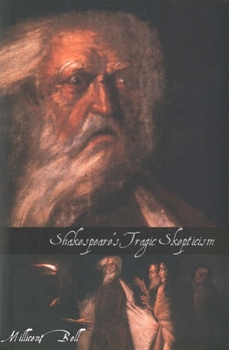Shakespeare's Tragic Skepticism
Readers of Shakespeare's greatest tragedies have long noted the absence of readily explainable motivations for some of Shakespeare's greatest characters: why does Hamlet delay his revenge for so long? Why does King Lear choose to renounce his power? Why is Othello so vulnerable to Iago's malice? But while many critics have chosen to overlook these omissions or explain them away, Millicent Bell demonstrates that they are essential elements of Shakespeare's philosophy of doubt. Examining the major tragedies, Millicent Bell reveals the persistent strain of philosophical skepticism. Like his contemporary, Montaigne, Shakespeare repeatedly calls attention to the essential unknowability of our world. In a period of social, political, and religious upheaval, uncertainty hovered over matters great and small--the succession of the crown, the death of loved ones from plague, the failure of a harvest. Tumultuous social conditions raised ultimate questions for Shakespeare, Bell argues, and ultimately provoked in him a skepticism which casts shadows of existential doubt over his greatest masterpieces.
Format:Hardcover
Language:English
ISBN:0300092555
ISBN13:9780300092554
Release Date:November 2002
Publisher:Yale University Press
Length:304 Pages
Weight:1.10 lbs.
Dimensions:1.0" x 5.8" x 8.5"
Customer Reviews
1 rating
Intelligent criticism
Published by Thriftbooks.com User , 18 years ago
It is not easy to say anything new about Shakespeare's plays, but these are intelligent essays by someone who has spent years thinking sensitively about them. It is indeed interesting to reflect that Shakespeare removes the motives for action given in his sources and deliberately works to create a sense of uncertainty.Plenty to think about.






